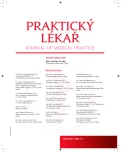Comments on controversies on the importance of vitamin C in oncology
Authors:
P. Klener
Authors‘ workplace:
Přednosta: prof. MUDr. Marek Trněný, CSc. ÚHKT, Praha
; Ředitel: prof. MUDr. Petr Cetkovský, PhD.
; I. interní klinika 1. LF UK a VFN, Praha
Published in:
Prakt. Lék. 2015; 95(5): 196-198
Category:
Reviews
Overview
Intravenous administration of high doses of vitamin C may reduce toxicity of chemotherapy. However, there is no high-quality evidence to suggest that this treatment in cancer patients enhances the antitumor effects. Placebo controlled trials are needed. Therapy with high dosage of vitamin C is non-toxic and may be used as complementary treatment when conventional anticancer therapy has to be terminated..
Keywords:
vitamin C – high intravenous dosage – cancer
Sources
1. Stone I. The healing factor: vitamin C against disease. New York: Grosset and Dumlap 1974.
2. Pohanka M, Pejchal J, Snopková S, et al. Ascorbic acid: On old player with a broad impact on body physiology including oxidative stress supression and immunomodulation: A review. Mini Rev Med Chem 2012; 1 : 35–43.
3. Niki E. Action of ascorbic acid as a scavenger of active and stable oxygen radicals. Am J Clin Nutr 1991; 54 : 1119–1122.
4. Gorton HC, Jarvis K. The effectivenes of vitamin C on preventing the symptoms of virus-induced respiratory infections. J Manipulative Physiol Ther 1999; 8 : 530–532.
5. Chambial S, Dwivedi S, Shukla KK, et al. Vitamin C in disease prevention and cure: an overwiev. Indian J Clin Biochem 2013; 4 : 314–328.
6. Parrow NL, Leshin JA, Levine M. Parenteral ascorbate as a cancer therapeutic: a reassessment based on pharmacokinetics. Antiox Redox Signal 2013; 19 : 2141–2156.
7. Verrax J, Calderon PB. Pharmacologic concentration of ascorbate are achieved by parenteral administration and exhibit antitumor effect. Free Radic Biol Med 2009; 47 : 32–40.
8. Gonzales MJ, Miranda-Massari JR. New insight on vitamin C and cancer. Heildeberg: Springer 2014.
9. Cameron E, Pauling L. Supplemental ascorbate in the supportive treatment of cancer: prolongation of survival times in terminal human cancer. Proc Natl Acad Sci USA 1978; 75 : 4538–4542.
10. Creagan ET, Moertel CG, O´Fallon JR, et al. Failure of high-dose vitamin C (ascorbic acid) therapy to benefit patients with advanced cancer. A controlled trial. N Engl J Med 1979; 301 : 687–690.
11. Kostiuk P, Kotlářová L, Procházka Z, Slíva J. Využití kyseliny askorbové v onkologii. Praha: Edukafarm 2013.
12. Yiang GT, Chou PL, Hung YT, et al. Vitamin C enhances anticancer activity in methotrexate-treated Hep3B hepatocellular carcinoma cells. Oncol Rep 2014; 3 : 1085–1063.
13. Huang XC, Maimaiti XY, Huabg CW, et al. Synergistic effects of arsenic trioxide combined with ascorbic acid in human osteosarcoma MG-63 cells: a system biology analysis. Eur Rev Med Pharmacol Sci 2014; 18 : 3877–3788.
14. Cullen JJ, Kubecová J, Marjirský M., a kol. Využití intravenózního vitaminu C u onkologického pacienta. Onkologie 2013; 7 : 196–200.
15. Ma Y, Chapman J, Levine M, et al. High-dose parenteral ascorbate enhanced chemosensitivity of ovarian cancer and reduced toxicity of chemotherapy. Sci Transl Med 2014; 5 : 222–228.
16. Fritz H. Intravenous vitamin C and cancer: A systematic review. Integr Cancer Ther 2014; 13 : 280–300.
17. Jacobs C, Hutton B, Ng T, et al. Is there a role for oral intravenous ascorbate (vitamin C) in treating patients with cancer? A systematic review. Oncologist 2015; 20 : 210–223.
18. Hoffer LJ, Robitaille L, Zakarian R, et al. High-dose intravenous vitamin C combined with cytotoxic chemotherapy in patients with advanced cancer: A phase I-II clinical trial. PLosOne 2015; 10(4): e0120228.
19. Barnes LA. Safety consideration with high ascorbic acid dosage. Ann NY Acad Sci 1975; 258 : 253–258.
20. Mikirova N, Csciari J, Riordan N, et al. Clinical experience with intravenous administration of ascorbic acid: achievable levels in blood for different states of inflammation and disease in cancer patients. J Transpl Med 2013; 11 : 191–200.
21. Carr AC, Vissers MC, Cook JS. The effect of intravenous vitamin C on cancer - and chemotherapy-related fatigue and quality of life. Front Oncol 2014; 4 : 283–285.
22. National Cancer Institute. High-dose vitamin C-for health professionals (PDQ®) [online]. Dostupné z: http://www.cancer.gov/about-cancer/treatment/cam/hp/vitamin-c-pdq.
Labels
General practitioner for children and adolescents General practitioner for adultsArticle was published in
General Practitioner

2015 Issue 5
- Advances in the Treatment of Myasthenia Gravis on the Horizon
- Hope Awakens with Early Diagnosis of Parkinson's Disease Based on Skin Odor
- Memantine in Dementia Therapy – Current Findings and Possible Future Applications
- Memantine Eases Daily Life for Patients and Caregivers
- Possibilities of Using Metamizole in the Treatment of Acute Primary Headaches
-
All articles in this issue
- Sleep problems of the elderly depending on the environment
- Sexology profile of patients after spinal cord injury
- White oral lesions – differential diagnosis
- Sepsis induced by purulent spondylodiscitis and pyelonephritis in an 80-years-old man
- Residential facilities providing care without authorisation – basic information for health care providers
- Comments on controversies on the importance of vitamin C in oncology
- The role of general practitioner and seniors‘ satisfaction with care
- The use of assessment tools for assessment fear of pain in children
- General Practitioner
- Journal archive
- Current issue
- About the journal
Most read in this issue
- White oral lesions – differential diagnosis
- Sexology profile of patients after spinal cord injury
- Sleep problems of the elderly depending on the environment
- The use of assessment tools for assessment fear of pain in children
